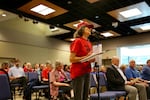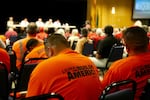
Supporters and opponents testify on a controversial plan to build the nation's largest oil-by-rail terminal in Vancouver, Washington.
Molly Solomon / OPB
More than 100 people testified before the Washington state Energy Facility Site Evaluation Council in Vancouver Wednesday. It was one of the last opportunities for the public to sound off on a proposed oil terminal there.
The council heard more than seven hours of testimony from both critics and supporters of a controversial plan to build the nation’s largest oil-by-rail terminal in Vancouver.
The hearing at Clark College was the last day for public comment on a draft notice of the construction air permit for the project.
The $210 million Vancouver Energy terminal, backed by Tesoro-Savage, would receive about four crude oil trains a day. The oil would be stored on site and later transferred to ships on the Columbia River. At full capacity, as many as 360,000 barrels of crude oil would pass through the terminal on a daily basis.
Many who testified against the terminal cited potential health hazards. Vancouver resident Alona Steinke said she worried about air pollution, especially for those who lived in neighborhoods closest to the site.
“To allow this project would cause Fruit Valley and other nearby neighborhoods to sacrifice their health for the greed of a dying industry,” said Steinke.
Fruit Valley resident and Port of Vancouver Commissioner Eric LaBrant was the first person to give testimony. He was elected in 2015 after running on an anti-terminal platform.
“This permit is functionally meaningless and built on alternative facts,” he said. “An ongoing airborne chemical spill in a neighborhood of 2,000 residents and 3,000 workers for a promise of 176 jobs is a bad plan.”

Supporters of the oil terminal project included local labor unions, who wore orange T-shirts at the hearing. Opponents of the project dressed in red.
Molly Solomon / OPB
Vancouver Energy spokesman Jeff Hymas said those 176 jobs would be direct on-site employment at the terminal once it’s completed. There would also be an additional 360 temporary jobs during the construction phase.
The company also said that safety concerns from opponents were exaggerated. Vancouver Energy general manager Jared Larrabee said the terminal would follow regulations set by the state to minimize environmental and health concerns.
“This is a state-of-the-art facility,” Larrabee said. “The permit has been reviewed, validated and vetted and we’ve confirmed that this is a minor source of emissions.”
Other supporters of the terminal included unions and industry tradespeople, many wearing bright orange shirts. They say the terminal would boost the region’s local economy.
“We’ve been losing out on industry in southwest Washington,” said Lee Newgent, executive secretary of the Washington State Building and Construction Trades Council. He says with the closure of mills and the decline of the lumber industry, he’s looking toward fossil fuel energy export.
“In no way are we climate deniers,” said Newgent. “But we also know our economy is based on carbon use.”
The council plans to make a recommendation in the coming months. That will go to Washington Gov. Jay Inslee for a final decision.